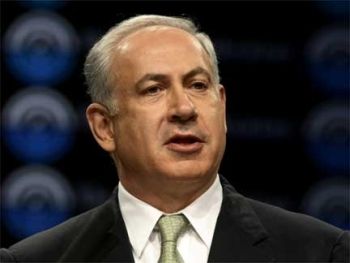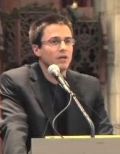
Publisher:
Bonnie King
CONTACT:
Newsroom@Salem-news.com
Advertising:
Adsales@Salem-news.com

~Truth~
~Justice~
~Peace~
TJP
May-23-2011 15:13

 TweetFollow @OregonNews
TweetFollow @OregonNews
Netanyahu and the One-State Solution
Neve Gordon for Salem-News.comIsrael's unwillingness to compromise on key issues might annul a two-state solution, making only power-sharing viable.
 Netanyahu photo courtesy: rfi.fr |
(JERUSALEM) - Prime Minister Benjamin Netanyahu will address US legislators on Tuesday. He will, no doubt, tell members of Congress that he supports a two-state solution, but his support will be predicated on four negative principles: no to Israel's full withdrawal to the 1967 borders; no to the division of Jerusalem; no to the right of return for Palestinian refugees; and no to a Palestinian military presence in the new state.
The problem with Netanyahu's approach is not so much that it is informed by a rejectionist worldview. The problem is not even Netanyahu's distorted conception of Palestine's future sovereignty, which Meron Benvenisti aptly described as "scattered, lacking any cohesive physical infrastructure, with no direct connection to the outside world, and limited to the height of its residential buildings and the depth of its graves. The airspace and the water resources will remain under Israeli control..."
Rather, the real problem is that Netanyahu's outlook is totally detached from current political developments, particularly the changing power relations both in the Middle East and around the world. Indeed, his approach is totally anachronistic.
Netanyahu's not-so-implicit threat that Israel will continue its colonial project if the Palestinians do not accept some kind of "Bantustan solution" no longer carries any weight. The two peoples have already passed this juncture.
The Palestinians have clearly declared that they will not bow down to such intimidations, and it is now clear that the conflict has reached an entirely new intersection.
At this new intersection, there are two signs. The first points towards the west and reads "viable and just two-state solution", while the second one points eastward and reads "power sharing".
The first sign is informed by years of political negotiations (from the Madrid conference in 1991, through Oslo, Camp David, Taba, and Annapolis) alongside the publication of different initiatives (from the Geneva Initiative and the Saudi Plan to the Nussaiba and Ayalon Plan), all of which have clarified what it would take to reach a peace settlement based on the two-state solution. It entails three central components:
1. Israel's full withdrawal to the 1967 border, with possible one-for-one land swaps so that ultimately the total amount of land that was occupied will be returned.
2. Jerusalem's division according to the 1967 borders, with certain land swaps to guarantee that each side has control over its own religious sites and large neighbourhoods. Both these clauses entail the dismantlement of Israeli settlements and the return of the Jewish settlers to Israel.
3. The acknowledgement of the right of return of all Palestinians, but with the following stipulation: while all Palestinians will be able to return to the fledgling Palestinian state, only a limited number agreed upon by the two sides will be allowed to return to Israel; those who cannot exercise this right or, alternatively, choose not to, will receive full compensation.
Israel's continued unwillingness to fully support these three components is rapidly leading to the annulment of the two-state option and, as a result, is leaving open only one possible future direction: power sharing.
The notion of power sharing would entail the preservation of the existing borders, from the Jordan valley to the Mediterranean Sea, and an agreed upon form of a power sharing government led by Israeli Jews and Palestinians, and based on the liberal democracy model of the separation of powers. It also entails a parity of esteem - namely, the idea that each side respects the other side's identity and ethos, including language, culture and religion. This, to put it simply, is the bi-national one-state solution.
Many Palestinians have come to realise that even though they are currently under occupation, Israel's rejectionist stance will unwittingly lead to the bi-national solution. And while Netanyahu is still miles behind the current juncture, it is high time for a Jewish Israeli and Jewish American Awakening, one that will force their respective leaders to support a viable democratic future for the Jews and Palestinians living between the Jordan River and the Mediterranean Sea. One that will bring an end to the violent conflict. This article first appeared in Al Jazeera
 Neve Gordon the author of Israel's Occupation, can be contacted through his website, www.israelsoccupation.info, Neve is an Israeli academic. He has been a visiting scholar at the University of California, Berkeley, the University of Michigan, Ann Arbor and the Watson Institute at Brown University. During the first intifada, he was the director of Physicians for Human Rights – Israel. Gordon is the co-editor of Torture: Human Rights, Medical Ethics and the Case of Israel, the editor of From the Margins of Globalization: Critical Perspectives on Human Rights, and most recently the author of Israel's Occupation. His writings have appeared in numerous scholarly journals as well as in publications like The Washington Post, LA Times, The Guardian, The Nation, Chicago Tribune, The Boston Globe, Chronicle of Higher Education and The National Catholic Reporter..
Neve Gordon the author of Israel's Occupation, can be contacted through his website, www.israelsoccupation.info, Neve is an Israeli academic. He has been a visiting scholar at the University of California, Berkeley, the University of Michigan, Ann Arbor and the Watson Institute at Brown University. During the first intifada, he was the director of Physicians for Human Rights – Israel. Gordon is the co-editor of Torture: Human Rights, Medical Ethics and the Case of Israel, the editor of From the Margins of Globalization: Critical Perspectives on Human Rights, and most recently the author of Israel's Occupation. His writings have appeared in numerous scholarly journals as well as in publications like The Washington Post, LA Times, The Guardian, The Nation, Chicago Tribune, The Boston Globe, Chronicle of Higher Education and The National Catholic Reporter..
>Special thanks to Neve Gordon and redress.cc
Articles for May 22, 2011 | Articles for May 23, 2011 | Articles for May 24, 2011

Quick Links
DINING
Willamette UniversityGoudy Commons Cafe
Dine on the Queen
Willamette Queen Sternwheeler
MUST SEE SALEM
Oregon Capitol ToursCapitol History Gateway
Willamette River Ride
Willamette Queen Sternwheeler
Historic Home Tours:
Deepwood Museum
The Bush House
Gaiety Hollow Garden
AUCTIONS - APPRAISALS
Auction Masters & AppraisalsCONSTRUCTION SERVICES
Roofing and ContractingSheridan, Ore.
ONLINE SHOPPING
Special Occasion DressesAdvertise with Salem-News
Contact:AdSales@Salem-News.com


Salem-News.com:

Terms of Service | Privacy Policy

All comments and messages are approved by people and self promotional links or unacceptable comments are denied.
Navid June 2, 2011 2:20 am (Pacific time)
Good to see a tanlet at work. I cant match that.
[Return to Top]©2025 Salem-News.com. All opinions expressed in this article are those of the author and do not necessarily reflect those of Salem-News.com.